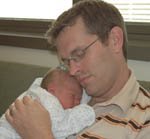Sometimes I wonder if I chose the wrong career. Maybe I'd be more suited to construction or landscaping or plumbing. I enjoy my job—most days—but given the choice, I'd dig holes in my yard or paint a wall or organize the garage before I'd proofread or edit or write (which is partly why you get long gaps in my blog on the weekend).
There's something very satisfying about physically laboring to complete a project and seeing tangible evidence of your accomplishments at the end of the day. In my job at the end of the day, I can look in my e-mail box to see a number of messages sent, I can look in my file to see articles edited, I can look at my calendar to see meetings attended, and occasionally, I can look at a page of something I wrote (or rewrote). And every three months I can see an 8.5x11 magazine with four score pages or so. But when you're building or fixing or cleaning, at the end of each day you can see something sizeable and tangible that other people will use or admire. And when your wife or daughter asks you what you did today, you have something to show.
Yesterday (Memorial Day), one of the young men I work with in church was doing his Eagle Scout service project; we took a dozen or so boys to a nonprofit mountain resort and dug holes and poured concrete while installing a Frisbee golf course. As I drove down the canyon at the end of the project, I realized we'd been at it almost six hours . . . and I loved it. It was cool to create something that thousands of people will use. It was satisfying to dig into the soil and batter large rocks to get them out of the way. It was pleasant to look up from my labor and see pine-covered slopes, cascading waterfalls, towering mountains, and vast snow fields still decorating the surrounding peaks.
Granted, much of the satisfaction I gain from manual labor would likely disappear if I did it all day every day. But still, I think there's something to it. It's in my genes; my father and grandfather and great grandfather (and several generations before that when most people didn't have "careers" outside farming) spent their work lives fixing things and making things and doing things. I feel like most days I don't do things; I think about things. Thinking is good—don't get me wrong—and I enjoy the "life of the mind," but sometimes I wish I did stuff instead. I think that's especially an issue in journalism, where we spend a lot of time writing about people who are doing things, and at times we—or at least I—feel like we're spectators of life. (An interesting thought just occurred to me; maybe this has something to do with why we sometimes have problems with activism among journalists, a lack of commitment to objectivity. Maybe journalists get frustrated just talking about people doing things; they want to be making a difference as well . . . just an idea.)
Anyway, enough of those rambling thoughts. Obviously, I like to think, so a thinking job is probably good for me. But on occasion I look out my window and wonder if I could find fulfillment in a career that would take me outside to do stuff . . .
The Weekend's Log Blog:
[Good stuff that happened]
 Friday: My younger brother became a dad at last (see photo).
Friday: My younger brother became a dad at last (see photo).Saturday: Lizzy, Caroline, and I had a "light party," which involved taking all of our toys with lights and music into a dark basement storage room and trying to keep them all going at the same time. It was a delightful half-hour of cacophony and flashing lights. Caroline even liked it (see other photo).
 Sunday: We planned our young men campout to the Escalante area: I'm very excited. Slot canyons, water falls, mountain lakes, petrified forests . . . it will be awesome.
Sunday: We planned our young men campout to the Escalante area: I'm very excited. Slot canyons, water falls, mountain lakes, petrified forests . . . it will be awesome.Monday: After years of looking (off and on) we bought a loveseat and finally moved our old couches to the basement where they belong.











